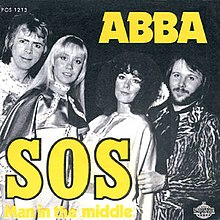History[edit]
"SOS" (working title; "Turn Me On") was written by
Benny Andersson,
Björn Ulvaeus and
Stig Anderson and was recorded at Glen Studio in
Långängen,
Sweden on 22–23 August 1974.
[1] The title itself was coined by Stig, though the lyrics he provided were re-written by Ulvaeus. "SOS" was among the first of three songs recorded for the group's 1975 album,
ABBA.
The song is unique among pop songs of the period, opening with unaccompanied classical keyboard in a subdued D-minor key. Unlike most ABBA tracks that preceded it, the vocal begins with an emotional solo performance by Fältskog. The descending chords and ominous
Minimoog synthesizer melody line of the introduction set the tone for Fältskog’s vocals, sounding almost as if she were breaking down in tears. The song then transitions to a rock chorus in a major key, dominated by a distorted electric guitar and full vocals.
Despite the song's catchiness, it was passed over as the lead single from the album; the track "
So Long" was chosen instead. "So Long" was chosen primarily because it had the same uptempo beat as their 1974 hit single, "
Waterloo".
Lyricist Ulvaeus has said that, after three years of trying to figure out what style would define them, ABBA found its identity as a pop group with the release of "SOS".
[2]
The song was the subject of one of the first pioneering music videos produced by director
Lasse Hallström for the band. Much of the video is filmed from an overhead camera, as if from a tower or lighthouse, with the bandmates' faces sometimes distorted, as though shot through a prism.
[3]
During the band's first visit to the United States, ABBA performed "SOS" on the long-running television program
American Bandstand on November 15, 1975.
[4]
ABBA performs the song live in the concert film
ABBA: The Movie, Hallström's first English-language feature film, filmed during the band's tour of Australia in 1977.
ABBA performed the song on its 1979 tour of Europe and North America. While the track does not appear on the filmed record of that tour—released on DVD as "ABBA in Concert"—it is featured on the 2014 audio release,
Live at Wembley Arena. For the first time on that tour, vocalists Fältskog and Lyngstad traded the line "when you're gone" responsively at the song's climax. Actors
Meryl Streep and
Pierce Brosnan would mimic the approach in recording "SOS" for the
soundtrack of the film version of
Mamma Mia! in 2008.
Reception[edit]
"SOS" marked a huge turnaround in ABBA's fortunes, most notably in the UK and Ireland, where it returned the group to the Top 10 for the first time since "
Waterloo". Reaching #6 and #4 respectively, "SOS" started a run of 18 consecutive Top 10 hits for ABBA in the UK and Ireland.
[5][6] "SOS" reached #1 in Australia, Belgium, France,
West Germany (where it spent 7 weeks at the top), New Zealand and South Africa, and was a Top 3 hit in
Austria, the
Netherlands, Norway, Italy (where it became ABBA's most successful hit), Mexico,
Rhodesia and
Switzerland. The song also became ABBA's second Top 20 hit in the United States, peaking at #15 (due to the single charting in the U.S. before "
I Do, I Do, I Do, I Do, I Do", whereas elsewhere "SOS" charted afterwards).
[7]
Chicago radio station
WLS, which gave "SOS" much airplay, ranked the song as the 61st biggest hit of 1975.
[8] It peaked at number six on their survey of 22 November 1975.
[9]
The track has a number of music industry devotees.
The Who guitarist
Pete Townshend has said "SOS" is one of the best pop songs ever written,
[10] adding that when he first heard the song he "was transported by it".
[11]
American singer-songwriter and former
Czars frontman
John Grant has called "SOS" "one of the greatest pieces of music ever made", adding that
Agnetha Fältskog's "perfect" lyrical interpretation and emotional delivery is "a beautiful thing".
[2]
British conductor and producer
Charles Hazlewood called the song's "supersonic" transition from an acoustic D-minor key to an electric rock motif "absolutely genius".
[2]
ABBA's performance of "SOS" on
American Bandstand in 1975 has been included on lists of the most significant performances in the show's 31 seasons by several reviewers and critics. Bill Lamb put the song at number five,
[13] as did Alicia Diaz Dennis
[14] and Andres Jauregui.
[15]
To date the song is the only
Hot 100 single (or #1 single in Australia
[16]) in which both the title and the credited act (and also the musical genre) are
palindromes.
[17]


No comments:
Post a Comment